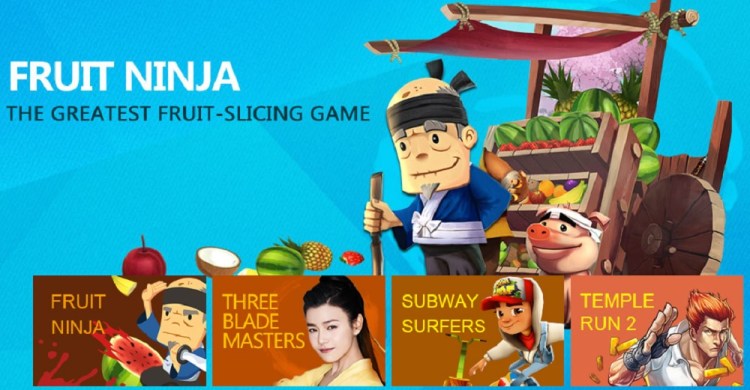GamesBeat: I went to a talk at GDC about Plants Vs. Zombies 2 and its launch in China. It was interesting, because they talked about the challenges they faced with things like piracy. They also got hit with so many low-scoring reviews that it brought their average for the game down from five to two in China. They had to do a lot to understand why that happened. I wonder if there are challenges like that in the Chinese market that you see and have to learn to deal with.
Lyndon: Currently, the only thing in the top 10 in China that’s not made in China and not published by us is Plants Vs. Zombies. Right now there are only four foreign-made games in the top 10 — Plants Vs. Zombies, Temple Run, Subway Surfer, and Fruit Ninja — and three of them we published. To come back to your question, you have more users in China that aren’t familiar with the idea of needing to pay for games. One of our biggest complaints that we get on our customer service hotline — we have a 24/7/365 hotline at iDreamSky where people can call and ask questions about any of our games — is, “Why am I paying for your games?” “Why is your game asking for my money?” “I downloaded your game from this app store six months ago, and then yesterday it started asking for money.” “I saw my friend playing this game, so I went to the Tencent app store and got a new version and it turned out that this version asked me for money.”
We get those questions a lot. Users just aren’t used to it, especially casual gamers. Someone gets their first smartphone, they’ve never dealt with apps before, and they feel like these are things that should be free – not just free to download, but free forever. It also comes down to how much monetization optimization you do. In Temple Run, for example, through the 360 app store, we were distributed more than 100 million times. I can’t remember the exact period of time, but in that same period, Plants Vs. Zombies did about 50 million downloads. If you were to compare the bad reviews, though, both games got about the same number.
We think that when Plants Vs. Zombies initially launched in China, they tried to optimize the monetization too much. They made the game way too hard, trying to drive users to pay. That backfired. But after a couple of weeks or months, they figured out the right balance of difficulty and how to reasonably ask for money. It’s a learning process. I think they’ve picked it up. They’re doing well now.
They get far fewer negative reviews than before.
GamesBeat: How much competition do you have out there for publishing western games in China? Are there other major publishers bringing out western content?
Lyndon: You have Chukong, Yodo1, TalkWeb, and iDreamSky. That’s it. And the only two companies that have had great success would be TalkWeb and iDreamSky. We’ve had the biggest success by far publishing western games in China. We’ve had three top 10 games, TalkWeb has had one, and the others haven’t had any.
GamesBeat: Do you have any predictions as far as how much of the market western games might be able to capture there?
Lyndon: It depends on what time frame you’re looking at. I’d say this year, we’re looking at eight to 30 percent of the market.
GamesBeat: What do you think about releasing games on top of platforms like WeChat? Are you excited about that kind of opportunity?
Lyndon: Absolutely. We’ve announced two releases on WeChat so far — Fruit Ninja and Temple Run — that we’ve developed for that platform on behalf of the original creators.
GamesBeat: Are some of the western developers and publishers still choosing to go directly into the Chinese market themselves with their mobile games?
Lyndon: Fewer and fewer developers are trying that. The market is becoming much more complicated than it used to be. Before, it was fragmented, but that just meant higher labor costs. All you needed to do was hire more people to make the calls and turn out the emails and do the legwork. As long as you had money, you could handle that.
Now, it’s more a question of knowledge, experience, and relationships. There are fewer app stores, but can you work with all of them harmoniously? How do you localize for Chinese tastes? Can you keep up with the pace of native Chinese developers? More western developers are looking for partners than are starting their own shops in China.
In my GDC talk, I discussed a couple of things. One is piracy. Besides just protecting our games with our technology, the most efficient method of combating piracy is making sure you work with all the stores. It’s a simple mechanism, which we’ve proven many times.
Most developers in China work only with the top app stores. There are 200 stores, but they only talk to the top 20, who have 80 percent of the download volume. It’s too much work to deal with the other 180, so they cut that corner. The problem is this. If you don’t provide a legitimate version through those other app stores, they have no reason to protect your interests. This is especially true if you have a popular game. Every app store wants to say, “We have these popular games, so you don’t need to go to any other store.” If you leave them out of the picture, it’s not like they’ll just pass on distributing your game. They’ll just distribute a version of your game that might not be the one you want distributed. It might be a small volume of total downloads at first, but it takes just one bad egg to ruin the whole basket.
Even though we get most of our traffic from those top 20 stores, then, we always make sure to work with all the little guys, so our goals are aligned. If they’re distributing our official version, they get their cut in the process. If they distribute a pirated version, they get traffic, but they don’t get a cut of monetization. This makes for an efficient way to combat piracy. You stop the distribution before it starts, instead of trying to sue people or make your app uncrackable. After all, there’s no such thing as “uncrackable” in the technology world.
The other thing is, each app store serves a different audience. They have their own characteristics. For instance, the Tencent app store is highly social, because it’s hooked up with WeChat and Mobile QQ. Games that have more social features work better in the Tencent ecosystem. When we distribute our games through Tencent, we make sure they have those social features that the Tencent audience wants, so they’re more willing to spend in our games.
Another example is Baidu. Their traffic comes from their search engine and their online forum communities. They run one of the biggest hardcore gaming communities in China. Recently we did an update for Baidu’s version of Subway Surfer that specifically focuses on competition, the Baidu Championship Tournament. You can only play that in the Baidu app store’s version. A third case is 360. After working with 360 for a long time, we realized that they have a lot casual users, a lot of users who are first-time gamers. With 360, we tend to distribute more casual games. We try to reduce the learning curve in 360 builds, so that it fits with their audience.
Altogether, if there are 20 app stores that matter, we have 20 different versions of our games and 20 different strategies for them. If we distribute 20 games, that’s 400 different versions, and we’re doing all the development for them. You can start to see the value proposition that iDreamSky presents to our partners.
GamesBeat: FunPlus raised $74 million. It seems like the financial momentum of Chinese companies is becoming very obvious. What do you think about that?
Lyndon: I can’t give out numbers as far as how much money we’ve raised right now, but I can talk about some of our investors. We’ve received investment from Legend Capital, a fund backed mainly by Lenovo. We’re also backed by Redpoint Ventures, from Silicon Valley. Currently we’re the largest distribution platform because of two metrics. One, we have more than 300 million registered devices and more than 110 million monthly active users. Our Q1 info indicates that we lead our market with a 23 percent share, compared to a total of about 23.5 percent between number two and number three. Our 2013 revenue grew by 10 times compared to our 2012 revenue. We’re looking at growing our revenue at least four or five times this year.
GamesBeat: How many people do you have working for you right now?
Lyndon: We have more than 400 employees. Our headquarters are based in Sunjian, the home of Tencent. We also have five to seven satellite offices around China, to ensure we have the best coverage. We’re growing very fast. In September of 2009 we founded the company with four people. Between then and now we’ve moved offices six times. I keep joking with my partners. “Stop signing two-year leases! We’re never going to stay in one place that long!”
GamesBeat: What sort of expansion plans do you have outside of China?
Lyndon: We think China is still a growing market. We’re interested in growing outside of China, though. I’m in charge of strategic investment, and we’re making investments in the United States, Japan, and Korea to start testing the waters. We’re hoping to nurture those investments into publishing arms in those regions. We’re being extra cautious about expanding outside our territory, though. We understand how it’s not that easy for western developers coming into China. It’s the same for Chinese developers moving into the west. As far as content acquisition, we have that covered already. We have the best content acquisition team in China. When we were 10 people, we were beating companies 10 or 20 times our size in that arena. I never believed that you actually needed people on the ground for that. You only need people on the ground if you’re doing publishing in that territory. A developer needs to be very in sync with the market they’re publishing in.
GamesBeat: It sounds like a collection of local publishing services. Do you think you’d ever grow into a global publishing service?
Lyndon: I’d like to say that, but we’re more humble and more realistic. That’s a goal we’ll try to reach. I think it’s every publisher’s goal eventually, to become a global publisher with their own platform and their own empire of content developers. That’s what iDreamSky is trying to become. We’ve had some success here and there with investing in content developers, which are making money in China through our publishing. We’re also working on selling those games in other territories now. We have potential buyers expressing interest, but we’re also wondering whether we want to sell those games ourselves.
VentureBeat's mission is to be a digital town square for technical decision-makers to gain knowledge about transformative enterprise technology and transact. Learn More



